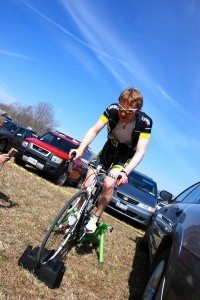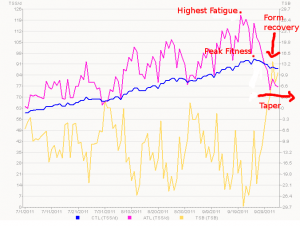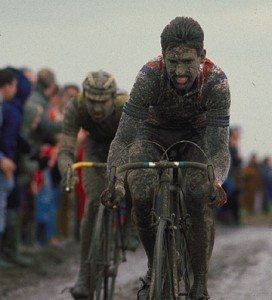The Sweet Taste of Victory…
 Or the bitter sting of defeat?
Or the bitter sting of defeat?
It’s been a psychologically (and let’s be honest, physically) difficult week post Battenkill. Sure, there’s the usual post-event down swing that accompanies any event that you’ve spent the better part of half a year preparing for. But between the elation of watching my coached athletes succeed at America’s toughest one day race and the misery of abandoning America’s toughest one day race, it’s been a psychological tug-o-war. And there have been constant reminders to deal with: the Strava comments, teammates wondering what happened and the depressing WKO+ upload.
While it’s been difficult to sort through the myriad of self discussions going on in my head, the ultimate irony was hearing Lou Reed’s “Perfect Day” come across my iPod while cleaning the Cambridge mud off my frame. And since the process of washing, drying and polishing a frame is hardly difficult or attention demanding work, I was able to really listen to the lyrics for the first time in a long time, extracting a lot of meaning out of those forty-one year old lyrics.
Just a perfect day, you made me forget myself
I thought I was, someone else, someone good
For days I’ve racked my brain, trying to come to grips with the crushing mental defeat that comes with abandoning a race. That bitter sting of defeat has been nagging me like a hangnail since I lay curled up on the side of the road. The first thoughts to go through my head were not of the difficulty breathing, or the pain squeezing my torso like a pair of vise grips, but more of the mental pain of failing to accomplish a goal. I’m competitive, if not with those around me, with myself. I had set a goal and I would not be able to complete it. In the moment, I felt at the very least I was letting down friends, family and teammates, lest of all myself. I felt all the work I had done, all the time I had spent designing and following my specific training plans, and all the planning I had put into the weekend was washed away in a sea of bad luck and uncontrollable circumstances. There was a moment in which a single tear slid down the side of my face as I pounded on the ground in frustration.
I trained and fought for the better part of five months just to get to where I was, and I know my form was high. Would I have won my field? No. Could I have been on the podium? Probably not. Could I have finished with a top 10 placing? Maybe. Top 20? Definitely. The only thing holding me back was….my back; a previous injury that I have been coping with for a year now, which I had described previously in these pages. In reality, there wasn’t much I could do (having thought I had everything under control), except take some lessons from the whole debacle.
To look at things in a different light, we take another page from Lou’s book:
Oh, it’s such a perfect day, I’m glad I spent it with you
Oh, such a perfect day, you just keep me hanging on
You just keep me hanging on.
It was serendipitous to fall like a soldier in combat by the side of the road. It allowed me to focus on pushing others through their races, watching their successes and encouraging their performances, allowing me to push away the feelings of defeat. The successes of others provided me a way to just keep hanging on, which was just what I needed at that moment.
That’s the thing about racing. You have successes and failures. You fight and usually you lose, but sometimes you win. The biggest lesson it can teach us is how to swallow our shattered pride, pick ourselves up off the pavement (or in this case pavé) and reload our guns for the next fight.
Marcellus Wallace put it best:
The night of the fight, you may feel a slight sting. That’s pride fucking with you. Fuck pride. Pride only hurts. It never helps. You fight through that shit.
You fight through that shit. And when you do, you realize that you’re stronger and more thoroughly prepared for the next time pride comes calling. It’s that preparation that silences the bitter sting of defeat and allows you to savor the sweet taste of victory.
Have you swallowed the bitter pill that is defeat? Talk about it in the comments:




